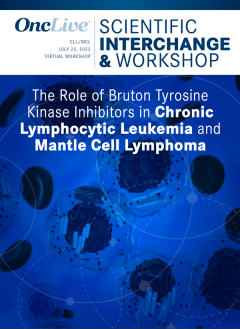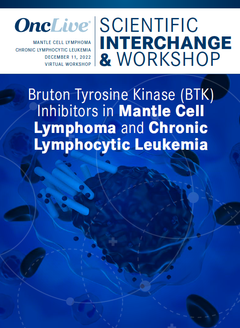
Dr. Phillips on BTK Inhibitor Selection in MCL
Tycel Phillips, MD, MPH, discusses how to approach selecting BTK inhibitors for patients with mantle cell lymphoma and treatment decisions following disease progression on a BTK inhibitor.
Episodes in this series

Tycel Phillips, MD, MPH, associate clinical professor, Division of Lymphoma, Department of Hematology & Hematopoietic Cell Transplantation, City of Hope, discusses how to approach selecting BTK inhibitors for patients with mantle cell lymphoma (MCL) and treatment decisions following disease progression on a BTK inhibitor.
The nuances of selecting between BTK inhibitors for patients with MCL have become more defined, Phillips begins. Ibrutinib (Imbruvica) was the original BTK inhibitor approved within MCL, and it still has a role in the space. Since ibrutinib features once daily dosing, it can serve as a good option for patients if treatment compliance is a concern, that is a good option, Phillips says. However, ibrutinib is associated with a higher incidence of atrial fibrillation, especially since MCL is typically diagnosed elderly patients, Phillips notes. Additional adverse effects associated with ibrutinib include rash, pneumonitis, infection, increased hypertension with time, and joint aches and pains, Phillips adds.
The second-generation BTK inhibitors acalabrutinib (Calquence) and zanubrutinib (Brukinsa) tend to have less of those AEs, which can lead to less discontinuation due to AEs, Phillips expands. There were previously issues when administered acalabrutinib concurrently with proton pump inhibitors; however, a newer formulation has addressed this, Phillips says. Acalabrutinib is given twice daily at a 100 mg dose, while zanubrutinib can be given either twice daily or once daily, and this agent has a higher incidence of neutropenia compared with ibrutinib or acalabrutinib, Phillips explains. Despite this, the second-generation drugs have generally shown a better toxicity profile compared with ibrutinib, Phillips adds.
In January 2023, the FDA approved the noncovalent BTK inhibitor pirtobrutinib (Jaypirca) for the treatment of adult patients with relapsed or refractory mantle cell lymphoma (MCL) following at least 2 lines of systemic therapy, including a BTK inhibitor. Although this BTK inhibitor appears to have the best toxicity profile to date, it is currently only approved for those who have progressed on one of the other three BTK inhibitors. However, the ongoing phase 3 BRUIN-MCL-321 trial (NCT04662255) is evaluating pirtobrutinib vs the other 3 covalent BTK inhibitors in patients with MCL who have received at least 1 prior line of treatment and are naïve to a BTK inhibitor.
If a patient experiences disease progression on ibrutinib, acalabrutinib, or zanubrutinib, switching to another covalent BTK inhibitor is not an option, Phillips says. If a patient has an intolerance issue with one covalent BTK inhibitor, it is feasible to switch to another covalent BTK inhibitor; however, after disease progression, other treatments need to be considered, Phillip adds.
The approval of pirtobrutinib now represents a potential option for patients who progress on a prior BTK inhibitor, and prior to this approval, treatment options were limited in this setting, Phillips notes. Prior to pirtobrutinib, the CAR T-cell therapy brexucabtagene autoleucel (Tecartus; formerly KTE-X19) was one of the only options in this setting. The CAR T-cell therapy was approved by the FDA in July 2020 for the treatment for adult patients with relapsed/refractory MCL.
Other treatments to consider in the post–BTK inhibitor setting include lenalidomide (Revlimid), bortezomib (Velcade), and chemotherapy regimens, although these regimens had limited efficacy compared with brexucabtagene autoleucel, Phillips says. Finding other agents following progression on a BTK inhibitor remains an area of need, Phillips concludes.















































